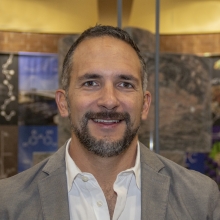CEE Seminar: What Would it Take to Build on Mars?

George W. Housner Professor of Civil and Mechanical Engineering
Cecil and Sally Drinkward Leadership Chair
Department of Mechanical and Civil Engineering
California Institute of Technology
Abstract: The human race is currently actively exploring our solar system and will need to develop infrastructure outside of our planet. In this talk, we will explore what it would take to build infrastructure on Mars – a key location for human exploration – where there is no direct access to common construction materials used on Earth, and where the most abundant and accessible material is regolith. The need to build on the red planet will drive the development of new materials and autonomous construction systems. These developments necessitate an urgent push to understand the physical and chemical properties of the regolith. Specifically, celestial soil mechanics can shed light into the mechanical behavior of these materials by relying on physics-based approaches and new tools such as artificial intelligence. In this talk, we will discuss some of the new developments in simulating the mechanics of regolith using physics-based models, as well as machine learning techniques, and how these could be relevant to building new worlds.
Bio: José E. Andrade is a professor in the Division of Engineering and Applied Science at the California Institute of Technology. Andrade joined Caltech after four years at Northwestern University as an assistant professor of theoretical and applied mechanics. Andrade earned his doctorate in civil engineering in 2006 from Stanford University. His research interests lie in the area of computational geomechanics with application to problems at the interface of physics and mechanics to develop predictive analytical and numerical models for porous materials (e.g., soils, rocks, concrete, bone, etc.). Andrade is the recipient of several honors and awards including the 2006 Zienkiewicz Medal in computational mechanics,the 2010 NSF CAREER Award, the 2011 Young Investigator Award from AFOSR, and the 2011 ASCE's Casagrande Award. Andrade's work is currently funded by NSF, U.S. DOE and AFOSR.
Share
Upcoming Events
-
MSE 298 Seminar: Quasi-1D/2D Charge-Density-Wave Materials - From Exotic Physics to Application Prospects
-
EECS Seminar: Steering Diffusion Models for Generative AI, From Multimodal Priors to Test-Time Scaling
-
MAE 298 SEMINAR: Hypersonic Viscous Aerothermochemistry - External Aerothermodynamics and Scramjet Fuel-Air Mixing
-
CBE 298 Seminar: Finding Catalysts of Gut Reactions - The Gut Microbiota in Disease Onset and Treatment
-
CEE Seminar: Confirming a Critical Foundation of Global Warming - Direct Observational Evidence from Space of the Impact of CO2 Growth on Infrared Spectra
